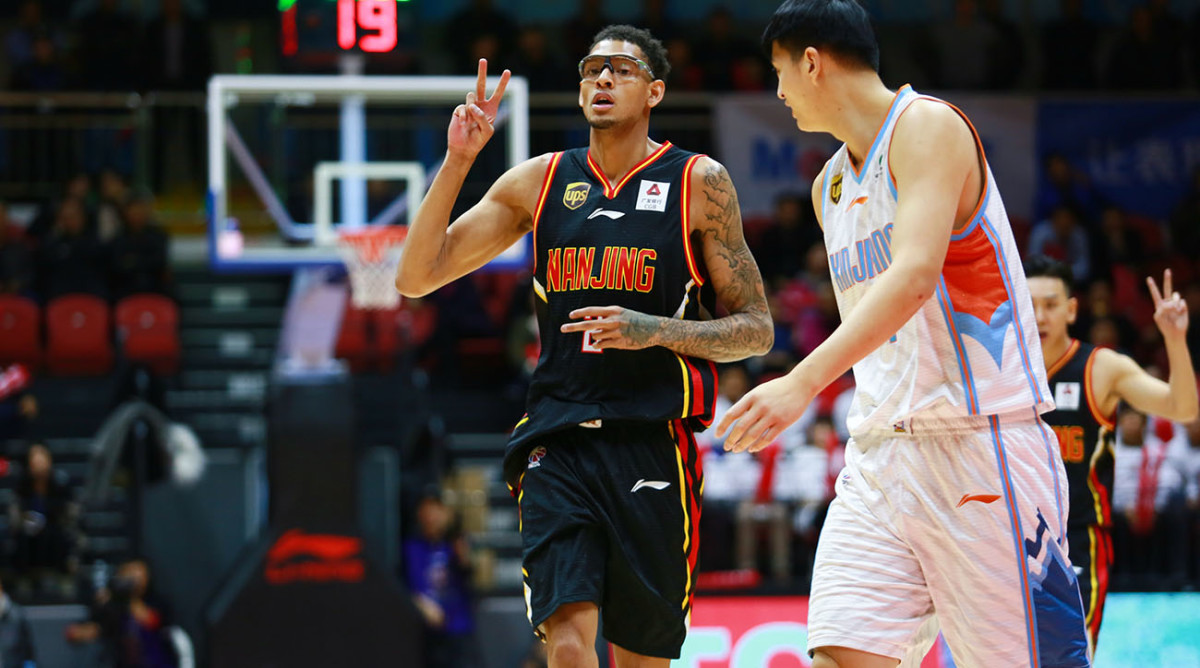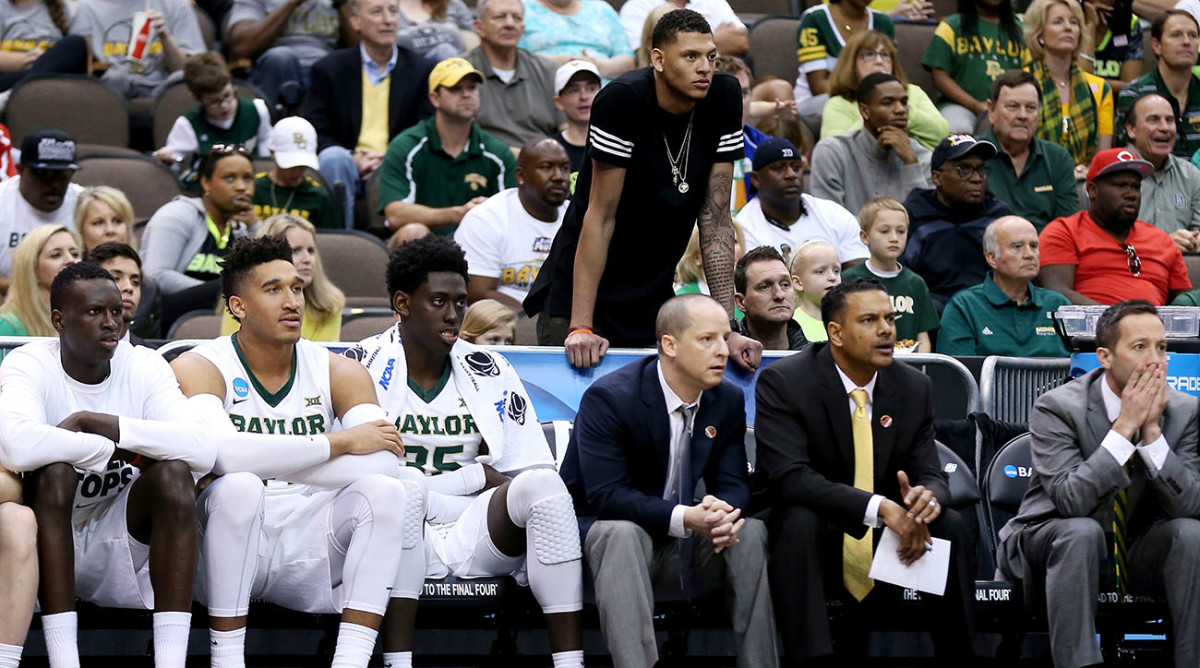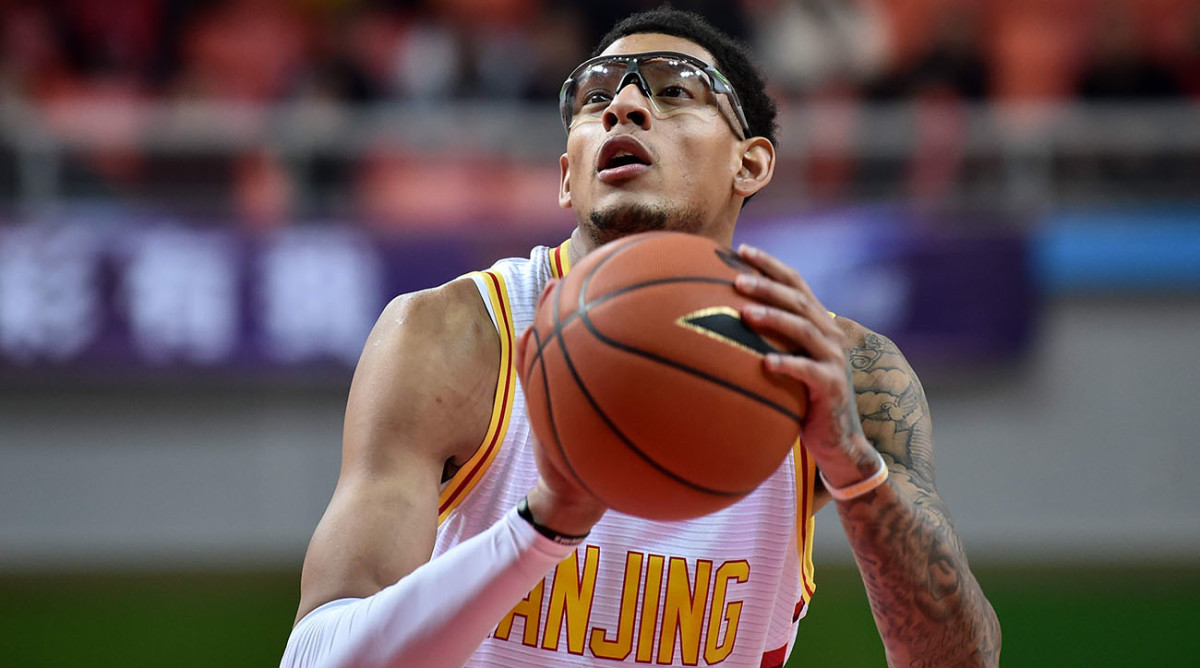Out of the Darkness: Isaiah Austin Searches for Peace Without the NBA

“I told you I was coming back, bro.”
The shopkeeper looks up with a start. A pudgy, bespectacled man wearing an orange bucket hat and penguin-themed socks, he nods but doesn’t respond as Isaiah Austin ducks into his small booth and starts sifting through the clothing racks. It’s hard to believe a previous visit would’ve been forgotten. Surely there aren’t many other 7-foot-1 Americans in the Eastern Chinese city of Nanjing these days, strolling around its labyrinthine underground malls while bargain-hunting for double-XL tees.
It’s a Tuesday afternoon in mid-March, nearing the end of Austin’s first season with the hometown Nanjing Monkey King of the Chinese Basketball Association, the country’s top league. Eventually satisfied with his apparel choices at MTV BEGIN FASHION SHOP, as the janky sign above the stall declares, he counts off a handful of pink 100 yuan notes—less than $15 USD apiece, printed with a gazing portrait of Mao Zedong—and forks them over.
As with many of his fellow expats, money was the main factor that drew the 25-year-old to China. Not only does the CBA offer a breezy five-month schedule, but its players generally command higher salaries than any professional outfit on the planet besides the NBA. By comparison, Austin earned $1,500 a month three years ago during his first international stop in Belgrade, Serbia, where his apartment was only accessible by walking through the downstairs nail salon. “After living in Serbia,” he says, “I felt like I could survive anywhere.”
Already he has endured more than most. Maybe you remember. Sightless in his right eye from an eighth-grade injury, Austin beat the odds to become a McDonald’s All-American and, later, a projected NBA lottery pick after his sophomore season at Baylor. Then he was diagnosed with Marfan syndrome, a genetic heart condition that forced his eleventh-hour withdrawal from the 2014 draft and continues to prevent him from living that ultimate dream today. “Always something, man,” he says. “One day blind, next day basketball stolen from me…”
The latest issue is an ankle injury that Austin suffered two nights ago in a loss to the Shanghai Sharks (and fellow castaway Jimmer Fredette), having landed awkwardly while coming down with a rebound. Back home, treatment would be no problem. But the Monkey King’s medical care is … lacking. While inspecting his foot, swollen to the size of a softball, the team doctor—a term used loosely—had pointed to a purple splotch of skin and, confused, asked Austin for an explanation.
It was a bruise.
The good news is that nothing was fractured, though, so Austin is currently exploring downtown Nanjing at a steady hobble, sans crutches or boot. He is accompanied by Sean Carter, a friend and former UMass forward who plays in barnstorming exhibitions across China, and crashes with Austin whenever he is in town. The shopping trip seems to have picked up Austin’s spirits after what appears to be a season-ending setback. So did, apparently, an enjoyable first experience sipping water from a cleavered coconut, purchased at a mall kiosk. But Austin was still frustrated from spending nearly two hours at a local hospital earlier today, waiting to receive an MRI and X-ray before finally walking out.
“Been dealing with too much s---,” he says.
“It’s China,” offers Carter. Translation: S--- happens.
“It’s my life, bro,” Austin replies. “Obstacle after obstacle.”

The previous night, a few hours after he returned from Shanghai, I visited Austin at the five-star hotel where the entire Nanjing roster stays during the season. A wheelchair was parked near the door, a hookah sat atop the coffee table, and Carter was on the couch. Austin was resting his injured leg across two ottomans, watching the comedy classic Friday while sipping a beer. Dinner was en route: street meat skewers fetched by the team’s English translator. “Been here 11 months,” Austin said. “Can’t wait to go home and get French toast and cold milk.”
As the movie continues, Chris Tucker and Ice Cube up to their various hijinx:Austin launches into a much heavier story: how he ended up in China. It starts on June 21, 2014, less than a week before the draft. It was an entirely ordinary in many ways, but Austin remembers the little details too. How he woke up at 6 a.m., and worked out at 7:30, practicing left-handed hooks and right-handed runners. How he finished around noon, then attended a barbecue at a family friend’s house. “We were just eating and having a good time,” Austin says. “I didn’t know everybody knew that I wasn’t going to be able to play again.”
A little after 8 p.m., he was pulling into his aunt’s driveway when he noticed a lineup of familiar cars along the street, including Baylor coach Scott Drew’s white G-wagon decoratedwith Bears license plates. At first, Austin thought that another pre-draft surprise party had been planned. But that changed once he walked through the door. Packed in the living room was every close member of Austin’s life: his parents, coaches, agent, brother, sister, mentor, pastor …
“My focus was beamed on my mother [Lisa Green],” Austin says. “She was in the back in the room. I remember her hands over her eyes, and her face was cherry pink from crying. Right there, I knew that my results from Marfan syndrome had come back positive.”
Eyes cast on the hotel carpet, he keeps going.
“My parents told me that I sat down on the ground, then got up. The only thing I remember was washing my face in the bathroom, looking at myself in the mirror. I wanted to wash all the tears away, try to get the redness out of my eyes. The two people who looked up to me the most were in that room, my little brother [Noah] and sister [Narrah]. I wanted to show them that even at my lowest point I could still be strong and carry the weight for the family.”
Thinking about the roughly 1 in 5,000 people affected by Marfan worldwide, Austin put on a heroically brave face over the next week, conducting a sit-down interview with ESPN’s Holly Rowe in which he announced the diagnosis, then attending the draft as an NBA guest. (“Something I’ll never forget,” he says. “The grace of Adam Silver.”) Soon he found a higher purpose, establishing the Isaiah Austin Foundation to support research for the disorder and fielding countless letters from children who looked up to him.
But inside he was headed down a dangerous path. “As I was at the draft, I was seeing guys super happy, about to make millions of dollars and they know that their life is basically going to be set after they sign that rookie contract deal,” he says. “I’m just hanging around like, ‘Man, what am I going to do now?’”

At Drew’s invitation, Austin returned to Baylor and effectively functioned as a graduate assistant on his former team for the start of the ‘14-15 season. Rebounding at shootaround, squeegeeing off sweat, fetching water bottles, those sorts of menial tasks. He was still around basketball, his first and strongest love, but says the school wouldn’t even let him hold a blocking pad during post drills at practice, fearful of potential liability if Austin’s had any cardiac complications due to his enlarged aorta. Initially he spent hours at the gym hoisting shots when no one was watching, but quit around Christmas because he hated the isolation. “It was hurting me too much,” he says.
To numb the pain, Austin turned to substance abuse. A handle of Hennessy would disappear in four days, mostly while Austin drank alone in his bedroom. He smoked weed often. He tried ecstacy a couple times. “Sipping on cough syrup with some lemonade in a Chick-Fil-A cup during class,” he says. “Anything I could to take that edge of depression off me, but at the same time it was putting me deeper and deeper. You don’t see nothing but darkness.”
The bleakest day was his 23rd birthday: Oct. 25, 2016. “I just didn’t want to deal with it anymore,” he says. “I didn’t want to have to keep smiling on the internet, or in front of cameras telling people I was completely fine, when deep down inside I was f------ wrecked. I could’ve had a choice to really end it and that’s what I wanted to do.” His plan was to swallow 10 pills, then fall asleep for good at his Waco apartment. “Luckily I had a friend that saw that I was hurting,” Austin says.
The friend was his roommate, Elliot Dickrell, who had been getting ready for a birthday night out when he spotted Austin through a cracked door. After a sobering talk, Dickrell flushed the pills down the toilet. Then they stayed home together and played Xbox. “I’d be fine if I had worked so hard my whole life and I wasn’t good enough to go to the NBA,” Austin says. “But I had no control over it. That's what made me suicidal. I just felt like it wasn’t fair.”
Austin never saw a therapist, nor did he ever enter rehab, but he speaks openly about his struggles so others will understand the demons of depression. His recovery started on his birthday. At Dickrell’s suggestion, Austin began writing down his emotions in a personal diary, which he credits for helping him embrace each day as it comes. When he moved out of Waco, he threw the diary away. “That was one of the things I wanted to just get out of my life,” he says. “Don’t have to take myself back to those moments at all. I just try to live in the present.”

Back at the hotel, a steady stream of visitors passes through Austin’s room. One teammate brings sandwiches. A hotel employee delivers room service: rice and broccoli. The translator drops off the skewers, then returns with a knockoff Louis Vutton suitcase to see if Austin wants to buy it. (Too small. No sale.) The team “doctor” also shows up, spraying Austin’s ankle with a mysterious menthol-smelling substance that he explains simply as, “Chinese medicine.”
Unlike many of his fellow Americans in the CBA, exhiles who have parlayed NBA credentials into cushy overseas gigs, Austin had no professional résumé when he started plotting his comeback after his 23rd birthday. Sober and stronger, he achieved a major victory when Dr. David Liang, a leading Marfan expert, concluded that Austin was symptom-free and at low risk of complications due to athletic activity, writing as much in a letter to potential teams.
The problem? Austin had been out of basketball for two and a half years. No clubs wanted to take that risk either.
The first to bite was Serbia' Crvena Zvezda, which signed Austin in Jan. ‘17. The nail salon was bad, but the low pay in Serbia was worse; his girlfriend Alexa Fogel was pregnant with their son Zeke at the time, so Austin regularly skipped meals because only one of them could afford to eat. “Couldn’t even buy coffee,” he says.Jaded by the European experience, Austin turned to Asia. That summer he made $30,000 a month while averaging 34.6 points and 13.4 rebounds for the Guangxi Rhinos in China’s second-tier league, followed by seven games on a Filipino squad. “I went to Taiwan, then I got hurt, and the team cut me,” he says. “And then I went to Lebanon, and I got cut because I got the flu.” Rejoining the Rhinos in 2018, he again led the team with 33.2 points and 10.4 boards in 32 games last summer.
On Oct. 1, Austin returned home to Richardson, Texas after his second NBL season. Fifteen days later, agent Charles Misuraca called with big news. A spot had opened up with the Monkey King, who needed a month-to-month injury replacement for former Michigan State forward Adreian Payne. It was a gamble to accept; a rule prohibited playing in both the CBA and NBL, thereby taking away a future fallback option if Payne healed fast and Austin was cut. “He called me and said he was all in,” Misuraca says. “It was really an emotional moment.”
Despite the Monkey King’s struggles this season—they will finish 11-34, next-to-last in the entire league—Austin has already defied expectations by sticking in China. He played well enough for Nanjing to keep him once Payne returned, posting 17.0 points and 8.5 rebounds per game in limited minutes alongside ex-Pacers guard Joe Young. (To emphasize domestic Chinese talent, each CBA team is only allowed two foreign imports, who may only share the court for two of the first three quarters, and not at all in the fourth.) He is also taking advantage of the Middle Kingdom’s vast economic potential, recently finding a manufacturer for his personal brand of sports goggles, Ispecs, through none other than Chinese basketball legend Stephon Marbury.
In the time since his diagnosis, Austin says that he has reached out to the NBA about receiving medical clearance on several occasions, emailing and calling officials to see if anything has changed.“I’ve tried as much as I can,” he says. “This is the only year where I haven’t contacted the NBA. I’ve given up on it.” The league declined to comment on Austin’s particular case through a spokesperson, citing medical privacy laws, referencing anAmerican Heart Association and American College of Cardiologyrecommendationthat Marfan-afflicted athletes stay away from basketball. “We’ve asked [the NBA], is there anything that we could’ve done to circumvent his stance?” Misuraca says. “The answer was no.”
This generality gnaws at Austin. “No one person is affected exactly the same by any type of disease, any type of cancer, anything,” he says. “I want you to go online, bro, see how frail most kids are who are born with it. Then I want you to look at my Instagram and my basketball video and see how I move. For the NBA to sit there and say, because of what’s written online about Marfan syndrome, they don't want to clear me, that’s what kills me most.
“But when I started to learn that Asia paid so much, I was like, this is where I want to be. I knew the NBA was no longer an option. Might as well be able to play to take care of my family.”
“So,” Austin says, “what did you think it was going to be like hanging out with us?”
We’re seated around a high-top table at Blue Frog, an American chain restaurant that roughly tracks as China’s answer to Applebee’s. Cigarette smoke wafts from the bar. A promo for an upcoming Nuggets-Timberwolves game appears on the television followed by Kobe Bryant hyping up the Chinese-hosted 2019 FIBA World Cup. We’re two shots deep of tequila, because Austin decided to buy a bottle of Olmeca… over lunch at 3:40 p.m.
Despite all the minor headaches—the commercial travel delays and subpar medical attention and language barrier—Austin is clearly having fun here. “Whatever I gotta do to stay happy,” he says. “Make sure I don’t go stir-crazy.” Shopping malls are everywhere, some with drinkable coconuts. The bullet train to Shanghai takes less than an hour, perfect for weekend getaways with Carter. But his priorities are straight. Imports with NBA pedigrees, like Young, can get away with skipping workouts. Not Austin.* “It don’t matter if I’m hungover, I’m at practice,” Austin says. “S---, I’m not making a million dollars. Gotta make sure I’m sticking.”
Over the next three months, Austin’s resolve will be rewarded. He will return to the Dallas-area home that he was finally able to purchase, throwing a big birthday party for Zeke's second birthday. He and Alexa will spend a week together in Jamaica, followed by a five-day family trip to Disney World.As he continues rehabbing his ankle, he will field lucrative offers from several first-tier teams in Japan, and later fly to Las Vegas to work out with a South Korean club. He will take his time with these options, finding confidence that his name has madethe Asian basketball map. It is possible, Misuraca estimates, that he could make seven figures somewhere next fall.
As a 7-footer with a smooth jumper and smoother handles, perfect for stretching the floor in today’s game, Austin should have no trouble finding future work. “I got a full CBA season under my belt,” Austin says proudly. “That’s going to be real good for my résumé anywhere in Asia.” Now that he is established, though, it is remarkable to take stock of every obstacle that Austin has overcome so far: the diagnosis, the depression, the shoulder injury that sidelined him from the NBA draft after his freshman year, the blindness in one friggin’ eye.
So where can Austin possibly go from here? International stardom? Marbury status? A stable career and a nice house for his family? Do not doubt Isaiah Austin, the baller who is coming back, bro.
